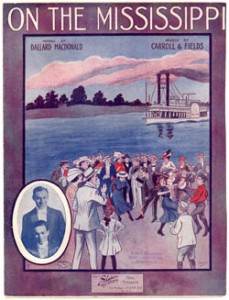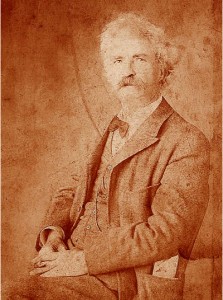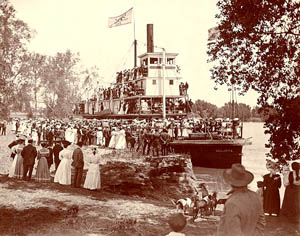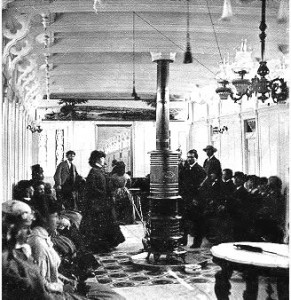One hundred years ago the grandeur of the Mississippi River was a central fact of everyday life. Goods and people traveled up and down its 4,000 winding miles from New Orleans to St. Paul.
A steamboat coming into port in small towns along the river brought everyone down to the wharf. Big New Orleans passenger packets stood three stories high and floated down the river like giant hotels. They were long and trim, with a glass and gingerbread pilothouse perched on top. Black smoke would billow from her chimneys, white columns of steam shot into the air, flags flew and whistles blew as she glided into port.
Mark Twain was born Samuel Clemens in 1835. He grew up on the river, and as a young man worked as a pilot on Mississippi steamboats. Almost two decades later, after establishing himself as a writer, Twain published a series of essays in The Atlantic Monthly, reminiscing about his early life as a cub pilot. These stories form the basis of his famous 1883 book, Life on the Mississippi.
It's a trip up the mighty Mississippi this week on Riverwalk Jazz, as New Orleans' Vernel Bagneris brings to life stories from Twain's Life on the Mississippi, in a radio theater presentation complete with sound effects of paddle wheelers, steam whistles and turn-of-the-century calliope.
The grand era of the Mississippi Riverboats played a significant role in the development and spread of jazz from New Orleans at the beginning of the 20th century. A young Louis Armstrong received valuable musical training working in dance bands aboard excursion steamboats run by John Streckfus, the man most responsible for developing the connection between dance music and riverboats on the Mississippi. It is said that Jazz Age cornetist Bix Beiderbecke heard his first live jazz coming from steamboats docked alongside the wharf in his native river town of Davenport, Iowa. And river towns St. Louis and Memphis have had strong associations with jazz and blues.
The Great River looms large in our collective imagination in songs that continue to serve as jazz vehicles— "Muddy Water," "Mississippi Mud," "Blue River" and "Lazy 'Sippi Steamer." The Jim Cullum Jazz Band and their guests perform these tunes and more, evoking the romance of the river. Jazz band pieces from Jerome Kern's ground-breaking musical Show Boat include — "Why Do I Love You?," "Life Upon the Wicked Stage" and "Ol' Man River."
Photo credit for Home Page: "On the Mississippi" 1912 sheet music. Image in public domain.
Text based on Riverwalk Jazz script by Margaret Moos Pick © 2011





